Organic Farming's Impact on Food Security: A Comparative Analysis
VerifiedAdded on 2022/11/16
|6
|1545
|460
Essay
AI Summary
This essay examines the comparative advantages of organic farming over conventional farming in ensuring food security. It begins by defining organic farming and highlighting its environmental benefits, such as energy efficiency, reduced greenhouse gas emissions, and soil conservation. The essay argues that organic farming contributes to reversing global warming by storing carbon in the soil and reducing the use of synthetic fertilizers. Furthermore, it emphasizes the role of organic farming in enhancing food production, increasing accessibility, and promoting water conservation. The essay also acknowledges the advantages of conventional farming, such as short-term productivity and lower production costs. However, it concludes that organic farming is superior in ensuring long-term food security due to its focus on quality, availability, and sustainable practices, particularly in regions like Australia, where organic farming is politically and socially supported. The essay references various sources to support its arguments.
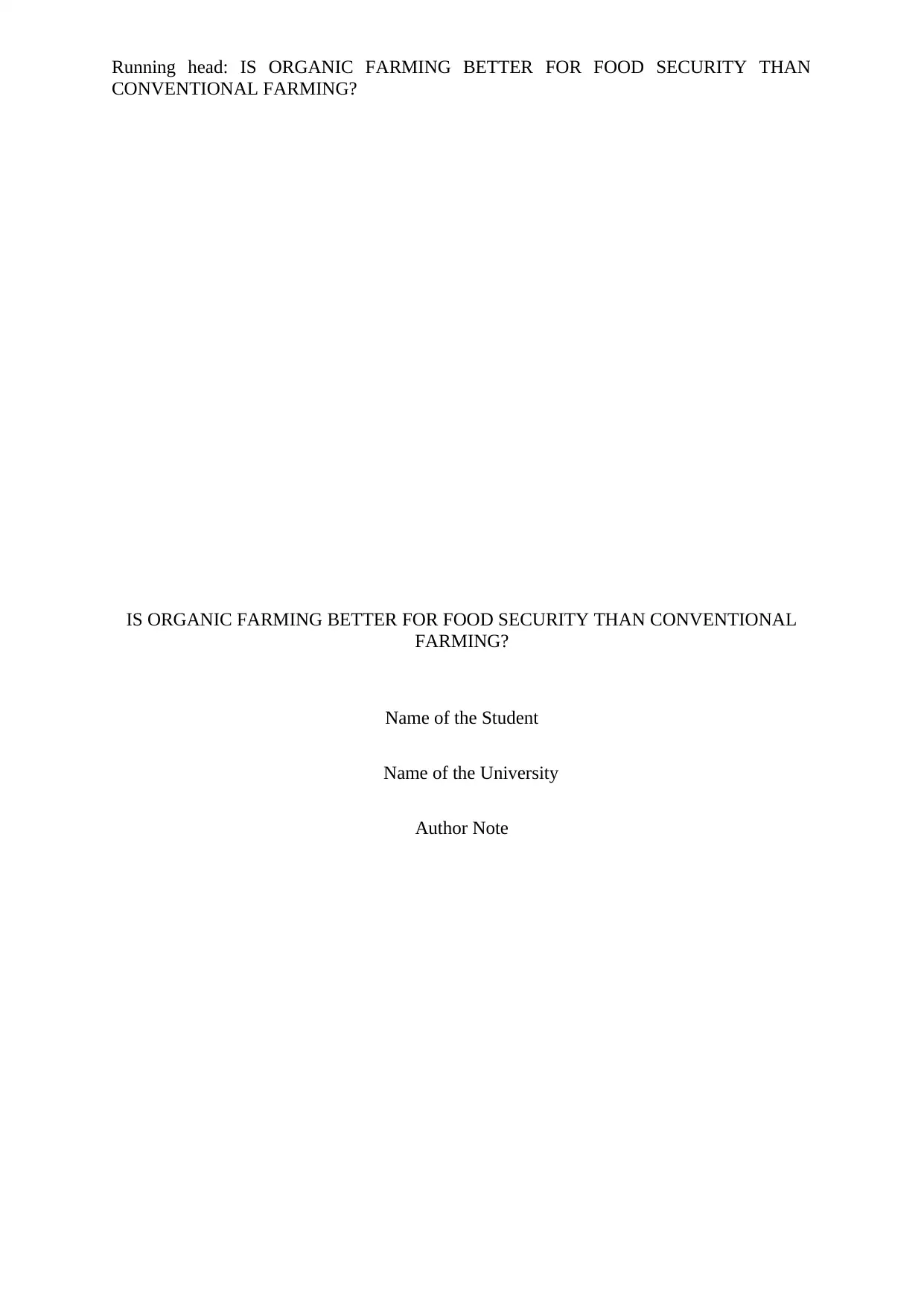
Running head: IS ORGANIC FARMING BETTER FOR FOOD SECURITY THAN
CONVENTIONAL FARMING?
IS ORGANIC FARMING BETTER FOR FOOD SECURITY THAN CONVENTIONAL
FARMING?
Name of the Student
Name of the University
Author Note
CONVENTIONAL FARMING?
IS ORGANIC FARMING BETTER FOR FOOD SECURITY THAN CONVENTIONAL
FARMING?
Name of the Student
Name of the University
Author Note
Paraphrase This Document
Need a fresh take? Get an instant paraphrase of this document with our AI Paraphraser
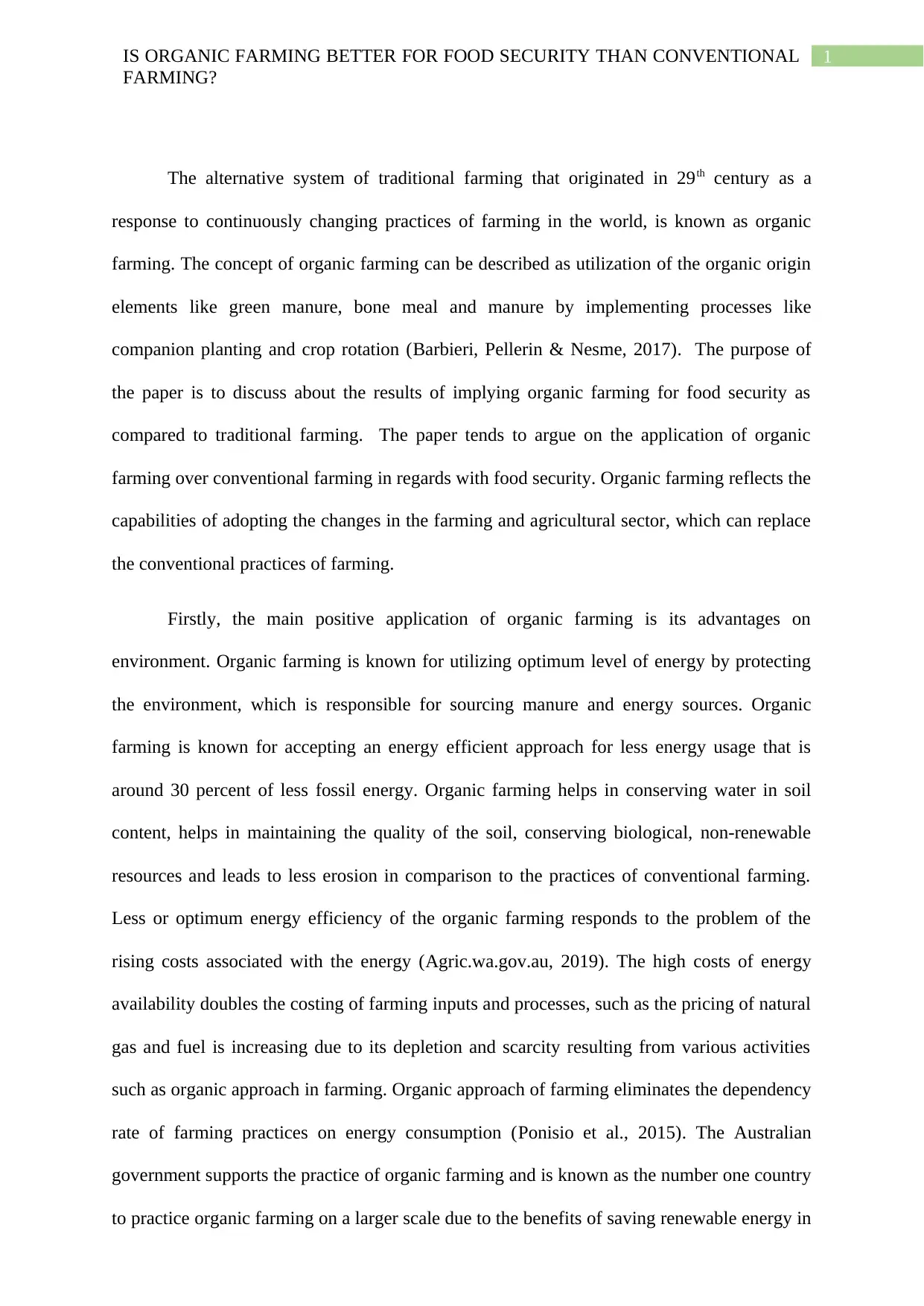
1IS ORGANIC FARMING BETTER FOR FOOD SECURITY THAN CONVENTIONAL
FARMING?
The alternative system of traditional farming that originated in 29th century as a
response to continuously changing practices of farming in the world, is known as organic
farming. The concept of organic farming can be described as utilization of the organic origin
elements like green manure, bone meal and manure by implementing processes like
companion planting and crop rotation (Barbieri, Pellerin & Nesme, 2017). The purpose of
the paper is to discuss about the results of implying organic farming for food security as
compared to traditional farming. The paper tends to argue on the application of organic
farming over conventional farming in regards with food security. Organic farming reflects the
capabilities of adopting the changes in the farming and agricultural sector, which can replace
the conventional practices of farming.
Firstly, the main positive application of organic farming is its advantages on
environment. Organic farming is known for utilizing optimum level of energy by protecting
the environment, which is responsible for sourcing manure and energy sources. Organic
farming is known for accepting an energy efficient approach for less energy usage that is
around 30 percent of less fossil energy. Organic farming helps in conserving water in soil
content, helps in maintaining the quality of the soil, conserving biological, non-renewable
resources and leads to less erosion in comparison to the practices of conventional farming.
Less or optimum energy efficiency of the organic farming responds to the problem of the
rising costs associated with the energy (Agric.wa.gov.au, 2019). The high costs of energy
availability doubles the costing of farming inputs and processes, such as the pricing of natural
gas and fuel is increasing due to its depletion and scarcity resulting from various activities
such as organic approach in farming. Organic approach of farming eliminates the dependency
rate of farming practices on energy consumption (Ponisio et al., 2015). The Australian
government supports the practice of organic farming and is known as the number one country
to practice organic farming on a larger scale due to the benefits of saving renewable energy in
FARMING?
The alternative system of traditional farming that originated in 29th century as a
response to continuously changing practices of farming in the world, is known as organic
farming. The concept of organic farming can be described as utilization of the organic origin
elements like green manure, bone meal and manure by implementing processes like
companion planting and crop rotation (Barbieri, Pellerin & Nesme, 2017). The purpose of
the paper is to discuss about the results of implying organic farming for food security as
compared to traditional farming. The paper tends to argue on the application of organic
farming over conventional farming in regards with food security. Organic farming reflects the
capabilities of adopting the changes in the farming and agricultural sector, which can replace
the conventional practices of farming.
Firstly, the main positive application of organic farming is its advantages on
environment. Organic farming is known for utilizing optimum level of energy by protecting
the environment, which is responsible for sourcing manure and energy sources. Organic
farming is known for accepting an energy efficient approach for less energy usage that is
around 30 percent of less fossil energy. Organic farming helps in conserving water in soil
content, helps in maintaining the quality of the soil, conserving biological, non-renewable
resources and leads to less erosion in comparison to the practices of conventional farming.
Less or optimum energy efficiency of the organic farming responds to the problem of the
rising costs associated with the energy (Agric.wa.gov.au, 2019). The high costs of energy
availability doubles the costing of farming inputs and processes, such as the pricing of natural
gas and fuel is increasing due to its depletion and scarcity resulting from various activities
such as organic approach in farming. Organic approach of farming eliminates the dependency
rate of farming practices on energy consumption (Ponisio et al., 2015). The Australian
government supports the practice of organic farming and is known as the number one country
to practice organic farming on a larger scale due to the benefits of saving renewable energy in
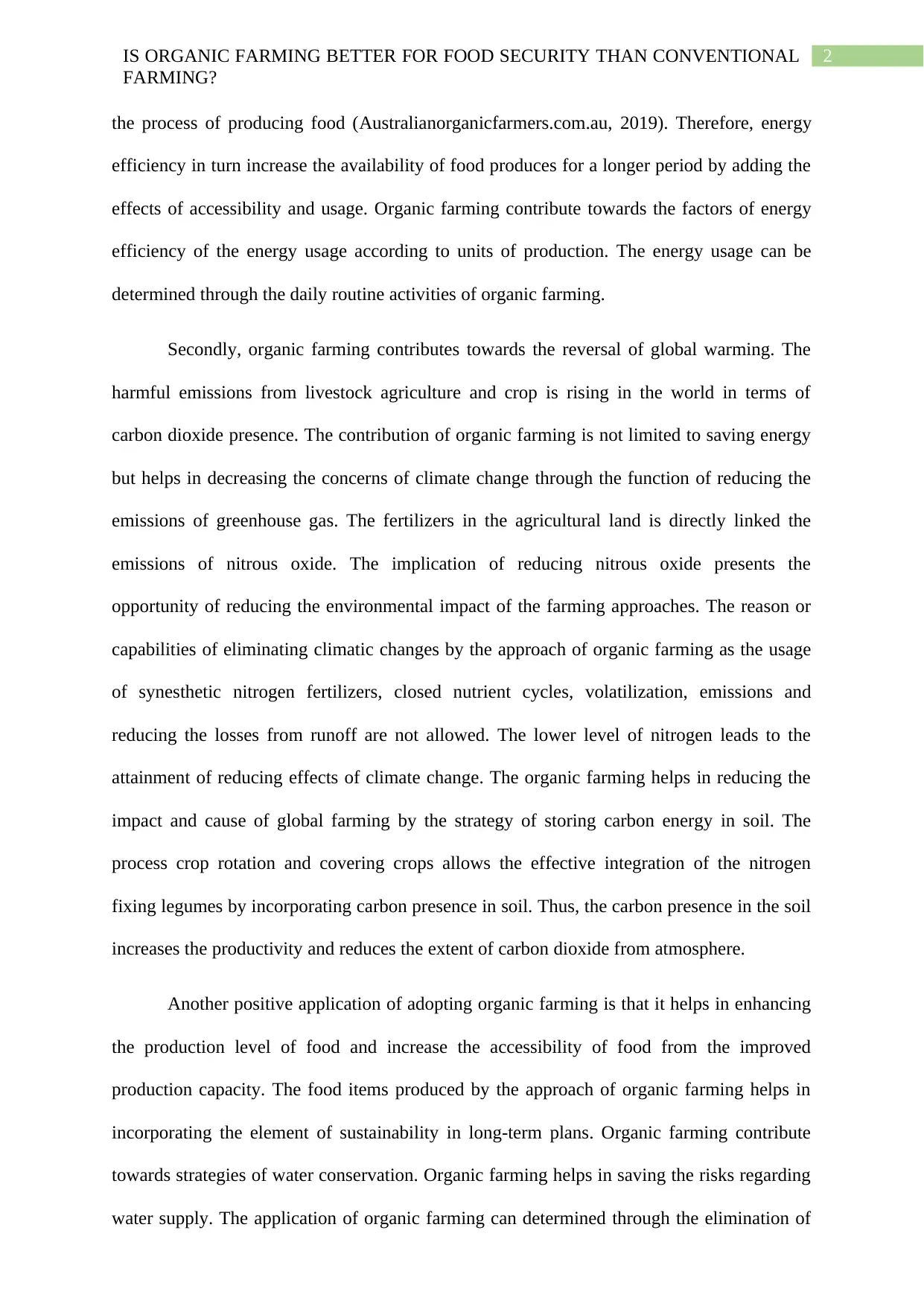
2IS ORGANIC FARMING BETTER FOR FOOD SECURITY THAN CONVENTIONAL
FARMING?
the process of producing food (Australianorganicfarmers.com.au, 2019). Therefore, energy
efficiency in turn increase the availability of food produces for a longer period by adding the
effects of accessibility and usage. Organic farming contribute towards the factors of energy
efficiency of the energy usage according to units of production. The energy usage can be
determined through the daily routine activities of organic farming.
Secondly, organic farming contributes towards the reversal of global warming. The
harmful emissions from livestock agriculture and crop is rising in the world in terms of
carbon dioxide presence. The contribution of organic farming is not limited to saving energy
but helps in decreasing the concerns of climate change through the function of reducing the
emissions of greenhouse gas. The fertilizers in the agricultural land is directly linked the
emissions of nitrous oxide. The implication of reducing nitrous oxide presents the
opportunity of reducing the environmental impact of the farming approaches. The reason or
capabilities of eliminating climatic changes by the approach of organic farming as the usage
of synesthetic nitrogen fertilizers, closed nutrient cycles, volatilization, emissions and
reducing the losses from runoff are not allowed. The lower level of nitrogen leads to the
attainment of reducing effects of climate change. The organic farming helps in reducing the
impact and cause of global farming by the strategy of storing carbon energy in soil. The
process crop rotation and covering crops allows the effective integration of the nitrogen
fixing legumes by incorporating carbon presence in soil. Thus, the carbon presence in the soil
increases the productivity and reduces the extent of carbon dioxide from atmosphere.
Another positive application of adopting organic farming is that it helps in enhancing
the production level of food and increase the accessibility of food from the improved
production capacity. The food items produced by the approach of organic farming helps in
incorporating the element of sustainability in long-term plans. Organic farming contribute
towards strategies of water conservation. Organic farming helps in saving the risks regarding
water supply. The application of organic farming can determined through the elimination of
FARMING?
the process of producing food (Australianorganicfarmers.com.au, 2019). Therefore, energy
efficiency in turn increase the availability of food produces for a longer period by adding the
effects of accessibility and usage. Organic farming contribute towards the factors of energy
efficiency of the energy usage according to units of production. The energy usage can be
determined through the daily routine activities of organic farming.
Secondly, organic farming contributes towards the reversal of global warming. The
harmful emissions from livestock agriculture and crop is rising in the world in terms of
carbon dioxide presence. The contribution of organic farming is not limited to saving energy
but helps in decreasing the concerns of climate change through the function of reducing the
emissions of greenhouse gas. The fertilizers in the agricultural land is directly linked the
emissions of nitrous oxide. The implication of reducing nitrous oxide presents the
opportunity of reducing the environmental impact of the farming approaches. The reason or
capabilities of eliminating climatic changes by the approach of organic farming as the usage
of synesthetic nitrogen fertilizers, closed nutrient cycles, volatilization, emissions and
reducing the losses from runoff are not allowed. The lower level of nitrogen leads to the
attainment of reducing effects of climate change. The organic farming helps in reducing the
impact and cause of global farming by the strategy of storing carbon energy in soil. The
process crop rotation and covering crops allows the effective integration of the nitrogen
fixing legumes by incorporating carbon presence in soil. Thus, the carbon presence in the soil
increases the productivity and reduces the extent of carbon dioxide from atmosphere.
Another positive application of adopting organic farming is that it helps in enhancing
the production level of food and increase the accessibility of food from the improved
production capacity. The food items produced by the approach of organic farming helps in
incorporating the element of sustainability in long-term plans. Organic farming contribute
towards strategies of water conservation. Organic farming helps in saving the risks regarding
water supply. The application of organic farming can determined through the elimination of
⊘ This is a preview!⊘
Do you want full access?
Subscribe today to unlock all pages.

Trusted by 1+ million students worldwide
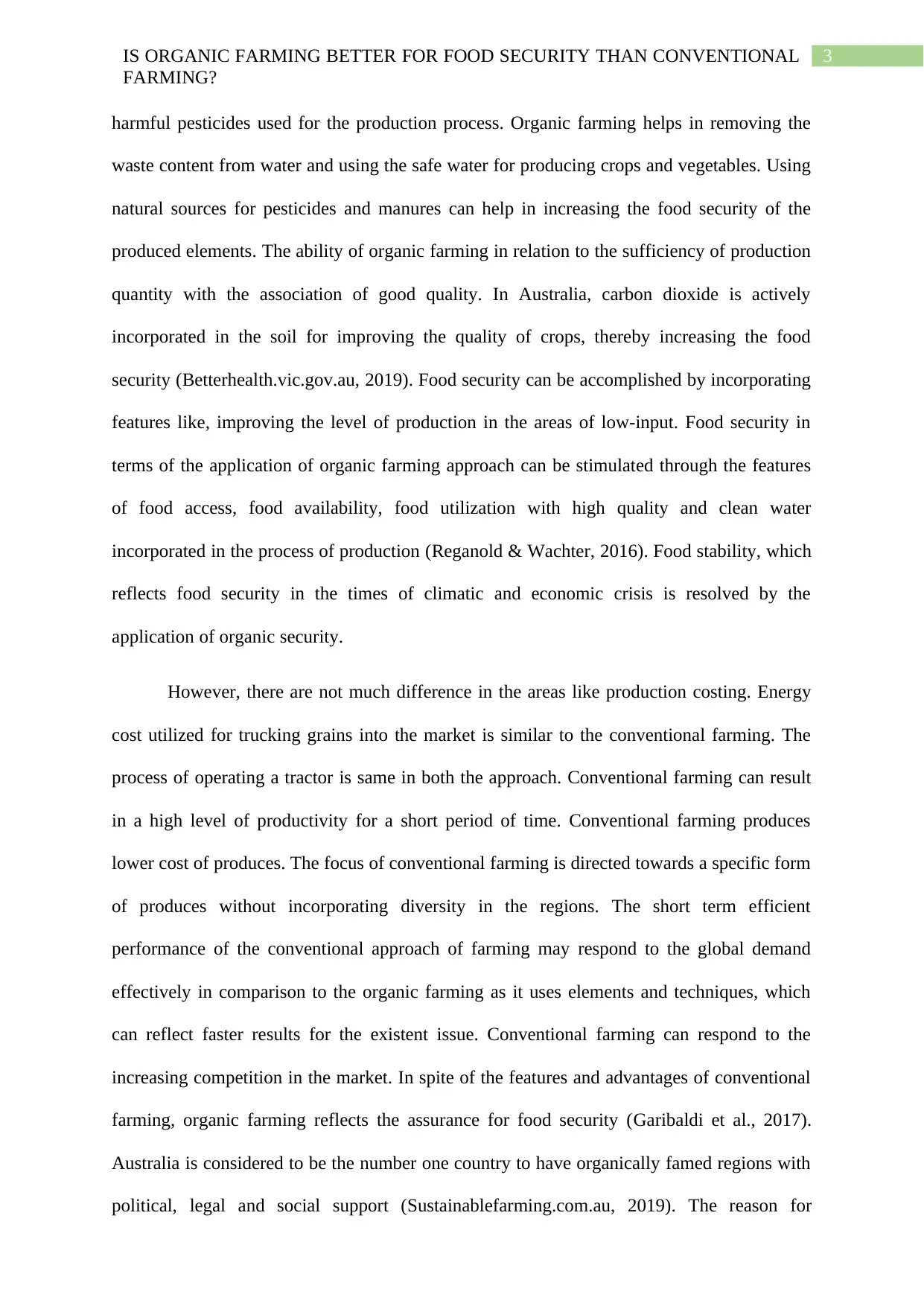
3IS ORGANIC FARMING BETTER FOR FOOD SECURITY THAN CONVENTIONAL
FARMING?
harmful pesticides used for the production process. Organic farming helps in removing the
waste content from water and using the safe water for producing crops and vegetables. Using
natural sources for pesticides and manures can help in increasing the food security of the
produced elements. The ability of organic farming in relation to the sufficiency of production
quantity with the association of good quality. In Australia, carbon dioxide is actively
incorporated in the soil for improving the quality of crops, thereby increasing the food
security (Betterhealth.vic.gov.au, 2019). Food security can be accomplished by incorporating
features like, improving the level of production in the areas of low-input. Food security in
terms of the application of organic farming approach can be stimulated through the features
of food access, food availability, food utilization with high quality and clean water
incorporated in the process of production (Reganold & Wachter, 2016). Food stability, which
reflects food security in the times of climatic and economic crisis is resolved by the
application of organic security.
However, there are not much difference in the areas like production costing. Energy
cost utilized for trucking grains into the market is similar to the conventional farming. The
process of operating a tractor is same in both the approach. Conventional farming can result
in a high level of productivity for a short period of time. Conventional farming produces
lower cost of produces. The focus of conventional farming is directed towards a specific form
of produces without incorporating diversity in the regions. The short term efficient
performance of the conventional approach of farming may respond to the global demand
effectively in comparison to the organic farming as it uses elements and techniques, which
can reflect faster results for the existent issue. Conventional farming can respond to the
increasing competition in the market. In spite of the features and advantages of conventional
farming, organic farming reflects the assurance for food security (Garibaldi et al., 2017).
Australia is considered to be the number one country to have organically famed regions with
political, legal and social support (Sustainablefarming.com.au, 2019). The reason for
FARMING?
harmful pesticides used for the production process. Organic farming helps in removing the
waste content from water and using the safe water for producing crops and vegetables. Using
natural sources for pesticides and manures can help in increasing the food security of the
produced elements. The ability of organic farming in relation to the sufficiency of production
quantity with the association of good quality. In Australia, carbon dioxide is actively
incorporated in the soil for improving the quality of crops, thereby increasing the food
security (Betterhealth.vic.gov.au, 2019). Food security can be accomplished by incorporating
features like, improving the level of production in the areas of low-input. Food security in
terms of the application of organic farming approach can be stimulated through the features
of food access, food availability, food utilization with high quality and clean water
incorporated in the process of production (Reganold & Wachter, 2016). Food stability, which
reflects food security in the times of climatic and economic crisis is resolved by the
application of organic security.
However, there are not much difference in the areas like production costing. Energy
cost utilized for trucking grains into the market is similar to the conventional farming. The
process of operating a tractor is same in both the approach. Conventional farming can result
in a high level of productivity for a short period of time. Conventional farming produces
lower cost of produces. The focus of conventional farming is directed towards a specific form
of produces without incorporating diversity in the regions. The short term efficient
performance of the conventional approach of farming may respond to the global demand
effectively in comparison to the organic farming as it uses elements and techniques, which
can reflect faster results for the existent issue. Conventional farming can respond to the
increasing competition in the market. In spite of the features and advantages of conventional
farming, organic farming reflects the assurance for food security (Garibaldi et al., 2017).
Australia is considered to be the number one country to have organically famed regions with
political, legal and social support (Sustainablefarming.com.au, 2019). The reason for
Paraphrase This Document
Need a fresh take? Get an instant paraphrase of this document with our AI Paraphraser
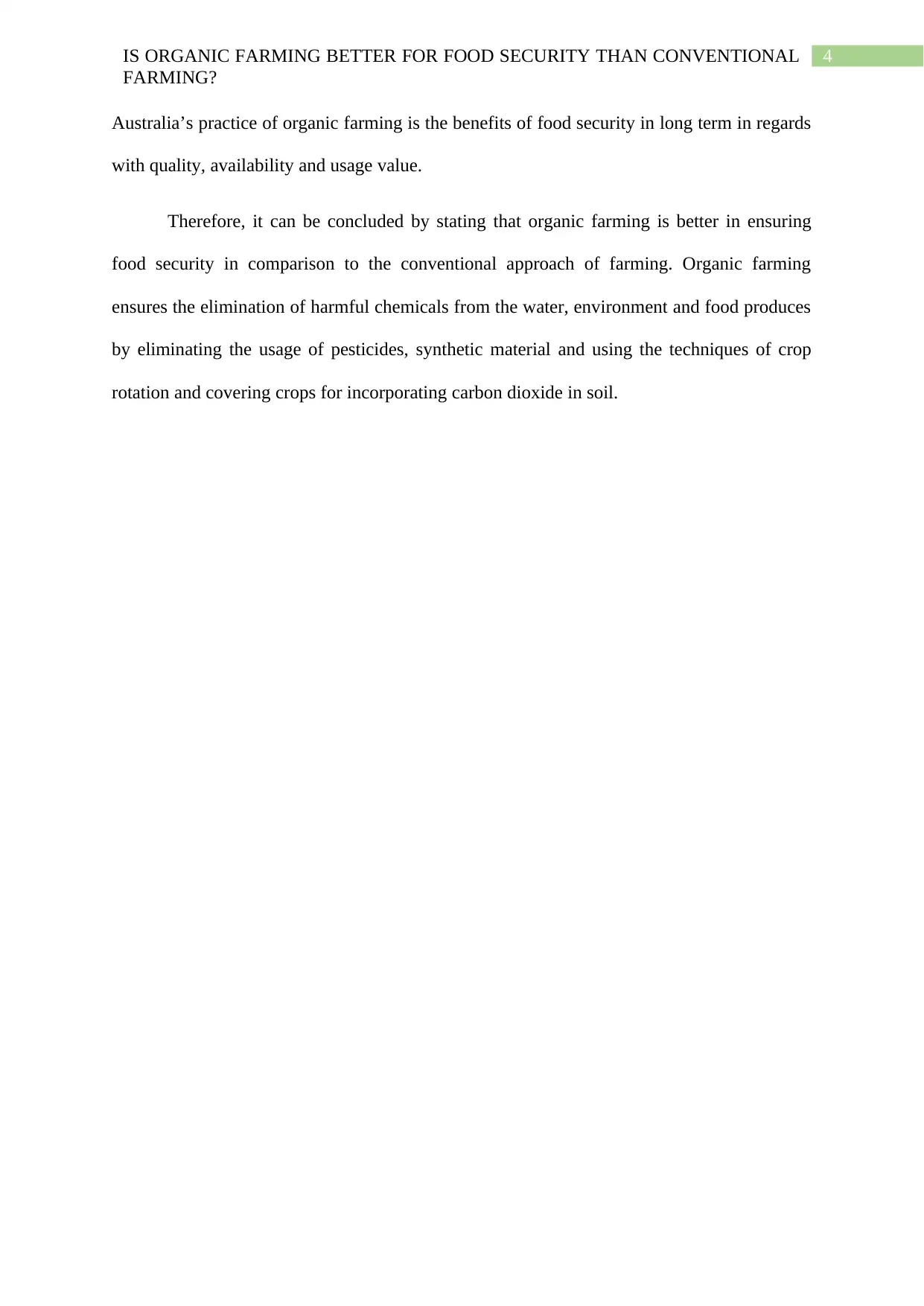
4IS ORGANIC FARMING BETTER FOR FOOD SECURITY THAN CONVENTIONAL
FARMING?
Australia’s practice of organic farming is the benefits of food security in long term in regards
with quality, availability and usage value.
Therefore, it can be concluded by stating that organic farming is better in ensuring
food security in comparison to the conventional approach of farming. Organic farming
ensures the elimination of harmful chemicals from the water, environment and food produces
by eliminating the usage of pesticides, synthetic material and using the techniques of crop
rotation and covering crops for incorporating carbon dioxide in soil.
FARMING?
Australia’s practice of organic farming is the benefits of food security in long term in regards
with quality, availability and usage value.
Therefore, it can be concluded by stating that organic farming is better in ensuring
food security in comparison to the conventional approach of farming. Organic farming
ensures the elimination of harmful chemicals from the water, environment and food produces
by eliminating the usage of pesticides, synthetic material and using the techniques of crop
rotation and covering crops for incorporating carbon dioxide in soil.
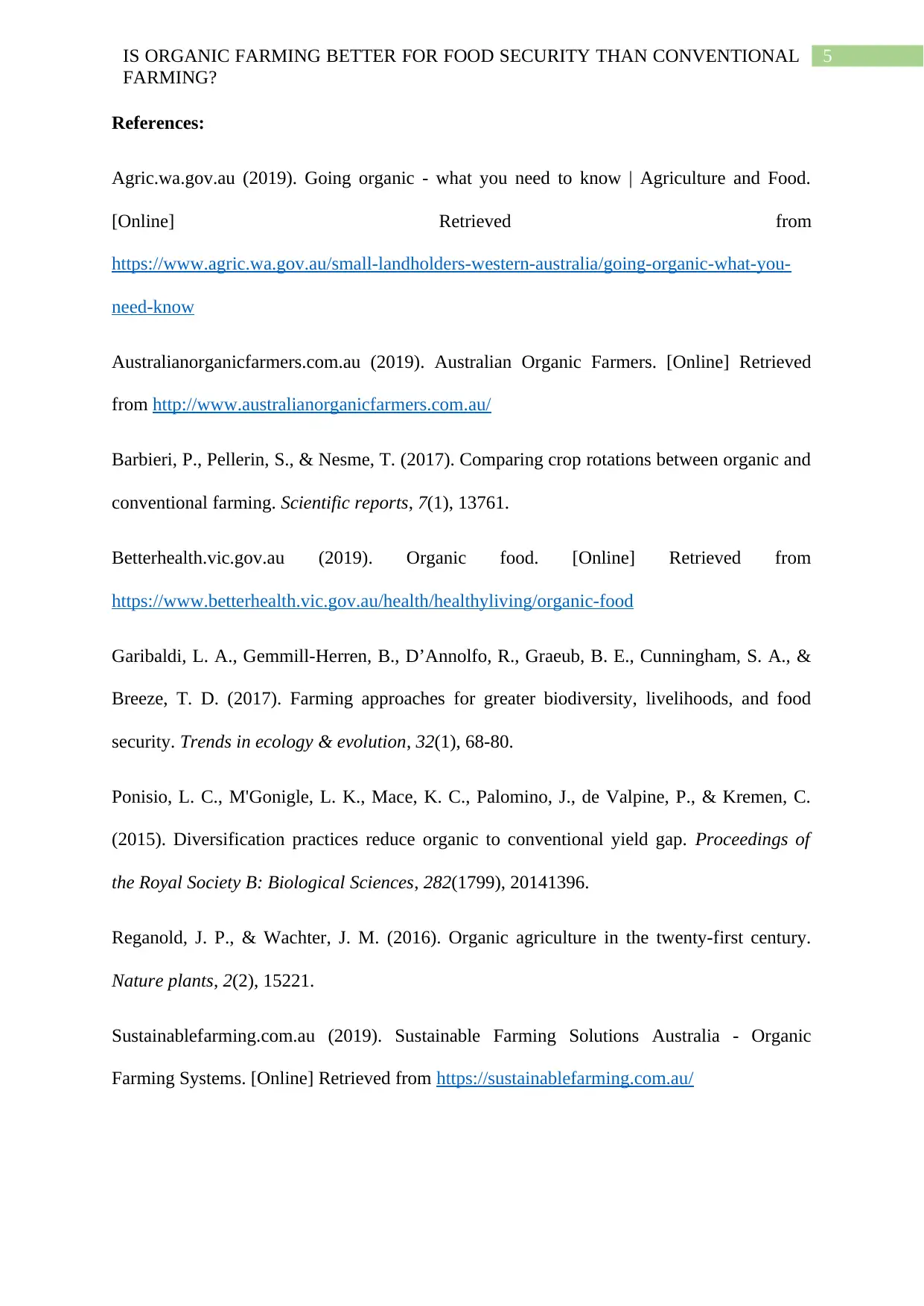
5IS ORGANIC FARMING BETTER FOR FOOD SECURITY THAN CONVENTIONAL
FARMING?
References:
Agric.wa.gov.au (2019). Going organic - what you need to know | Agriculture and Food.
[Online] Retrieved from
https://www.agric.wa.gov.au/small-landholders-western-australia/going-organic-what-you-
need-know
Australianorganicfarmers.com.au (2019). Australian Organic Farmers. [Online] Retrieved
from http://www.australianorganicfarmers.com.au/
Barbieri, P., Pellerin, S., & Nesme, T. (2017). Comparing crop rotations between organic and
conventional farming. Scientific reports, 7(1), 13761.
Betterhealth.vic.gov.au (2019). Organic food. [Online] Retrieved from
https://www.betterhealth.vic.gov.au/health/healthyliving/organic-food
Garibaldi, L. A., Gemmill-Herren, B., D’Annolfo, R., Graeub, B. E., Cunningham, S. A., &
Breeze, T. D. (2017). Farming approaches for greater biodiversity, livelihoods, and food
security. Trends in ecology & evolution, 32(1), 68-80.
Ponisio, L. C., M'Gonigle, L. K., Mace, K. C., Palomino, J., de Valpine, P., & Kremen, C.
(2015). Diversification practices reduce organic to conventional yield gap. Proceedings of
the Royal Society B: Biological Sciences, 282(1799), 20141396.
Reganold, J. P., & Wachter, J. M. (2016). Organic agriculture in the twenty-first century.
Nature plants, 2(2), 15221.
Sustainablefarming.com.au (2019). Sustainable Farming Solutions Australia - Organic
Farming Systems. [Online] Retrieved from https://sustainablefarming.com.au/
FARMING?
References:
Agric.wa.gov.au (2019). Going organic - what you need to know | Agriculture and Food.
[Online] Retrieved from
https://www.agric.wa.gov.au/small-landholders-western-australia/going-organic-what-you-
need-know
Australianorganicfarmers.com.au (2019). Australian Organic Farmers. [Online] Retrieved
from http://www.australianorganicfarmers.com.au/
Barbieri, P., Pellerin, S., & Nesme, T. (2017). Comparing crop rotations between organic and
conventional farming. Scientific reports, 7(1), 13761.
Betterhealth.vic.gov.au (2019). Organic food. [Online] Retrieved from
https://www.betterhealth.vic.gov.au/health/healthyliving/organic-food
Garibaldi, L. A., Gemmill-Herren, B., D’Annolfo, R., Graeub, B. E., Cunningham, S. A., &
Breeze, T. D. (2017). Farming approaches for greater biodiversity, livelihoods, and food
security. Trends in ecology & evolution, 32(1), 68-80.
Ponisio, L. C., M'Gonigle, L. K., Mace, K. C., Palomino, J., de Valpine, P., & Kremen, C.
(2015). Diversification practices reduce organic to conventional yield gap. Proceedings of
the Royal Society B: Biological Sciences, 282(1799), 20141396.
Reganold, J. P., & Wachter, J. M. (2016). Organic agriculture in the twenty-first century.
Nature plants, 2(2), 15221.
Sustainablefarming.com.au (2019). Sustainable Farming Solutions Australia - Organic
Farming Systems. [Online] Retrieved from https://sustainablefarming.com.au/
⊘ This is a preview!⊘
Do you want full access?
Subscribe today to unlock all pages.

Trusted by 1+ million students worldwide
1 out of 6
Related Documents
Your All-in-One AI-Powered Toolkit for Academic Success.
+13062052269
info@desklib.com
Available 24*7 on WhatsApp / Email
![[object Object]](/_next/static/media/star-bottom.7253800d.svg)
Unlock your academic potential
Copyright © 2020–2026 A2Z Services. All Rights Reserved. Developed and managed by ZUCOL.





